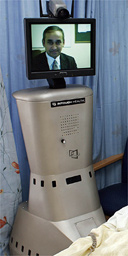
Patients, especially those suffering from dementia, are happy to consult a robot rather than a real doctor, researchers involved in the first robodoc trials in a UK hospital said today.
Parv Sains, who is leading the project at St Mary's hospital in London said patients have easily adjusted to seeing the robot on its ward rounds. He said: "There was a bit of a wow factor first off but patients have been quite receptive to it.
"It's all a bit Star Treky if you think about it, but then if you look at the military they have been using remote units for years as well as industry. There is no reason why the NHS can't move in that direction in order to deliver care or gaps in care now."
Mr Sains, specialist registrar and research fellow at St Mary's, said in the US - where the robot is also being used in three hospital pilots - research has already shown that elderly patients with dementia respond better to "novel" interaction with a robot than with a human doctor.
He said: "Another study in the US also found that some patients actually preferred being seen by the robot if it meant that otherwise they would be seen by another doctor who was not their own doctor or specialist."
The RP6 robot, called Sister Mary or Dr Robbie by hospital staff, is doing ward rounds on a general surgery ward as well as seeing patients in casualty. The robot can see the patient, view patient records, analyse test results and even ask questions.
The robot's body is shaped like a dustbin and its head is a computer screen - which can move up and down and from side to side - with a webcam on top.
The machine is controlled by a doctor, using a joy stick, sitting at a remote computer. As the robot moves around the patient's bed the doctor's face appears on its computer screen as if it was a real life personal consultation.
The chairman of the Patients Association, Michael Summers, said the NHS had to move into the 21st century.
He said: "At a time when we have a scarcity of doctors we have to make use of the technology which is available. We mustn't be old fashioned in our approach to medicine."
He said a robot would be able to carry out a ward round a lot faster than an ordinary doctor, although he thought that elderly patients might feel uncomfortable with the consultation and prefer to see a real doctor instead.
Mr Summers said: "We would be horrified if robots ever replaced doctors. We take the view that they are an adjunct to the work that doctors do - you can't replace a human being with a robot."
The British Medical Association, which represents doctors, described the introduction of robodocs on ward rounds as "exciting".
The chairman of its IT committee, Dr John Powell, said this afternoon: "It could offer health care benefits to areas where access to a specialist is considerably limited, such as remote rural areas or parts of the developing world.
"If there is work to show that patients are happy with this we need to pay attention to that. But I don't see this as anything to do with workforce - this doesn't replace the hands-on stuff which doctors do. We still need the same number of people to do that."
A Department of Health spokesperson said: "These robots are a great innovation, not intended to replace doctors but to provide them with an added communication tool and provide patients with the opportunity to have continued contact with senior clinicians."

